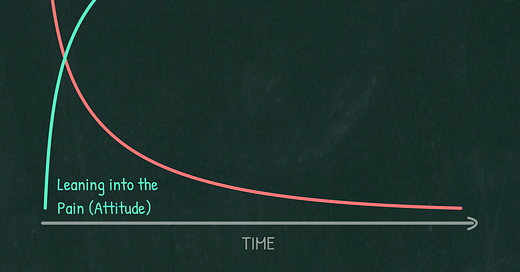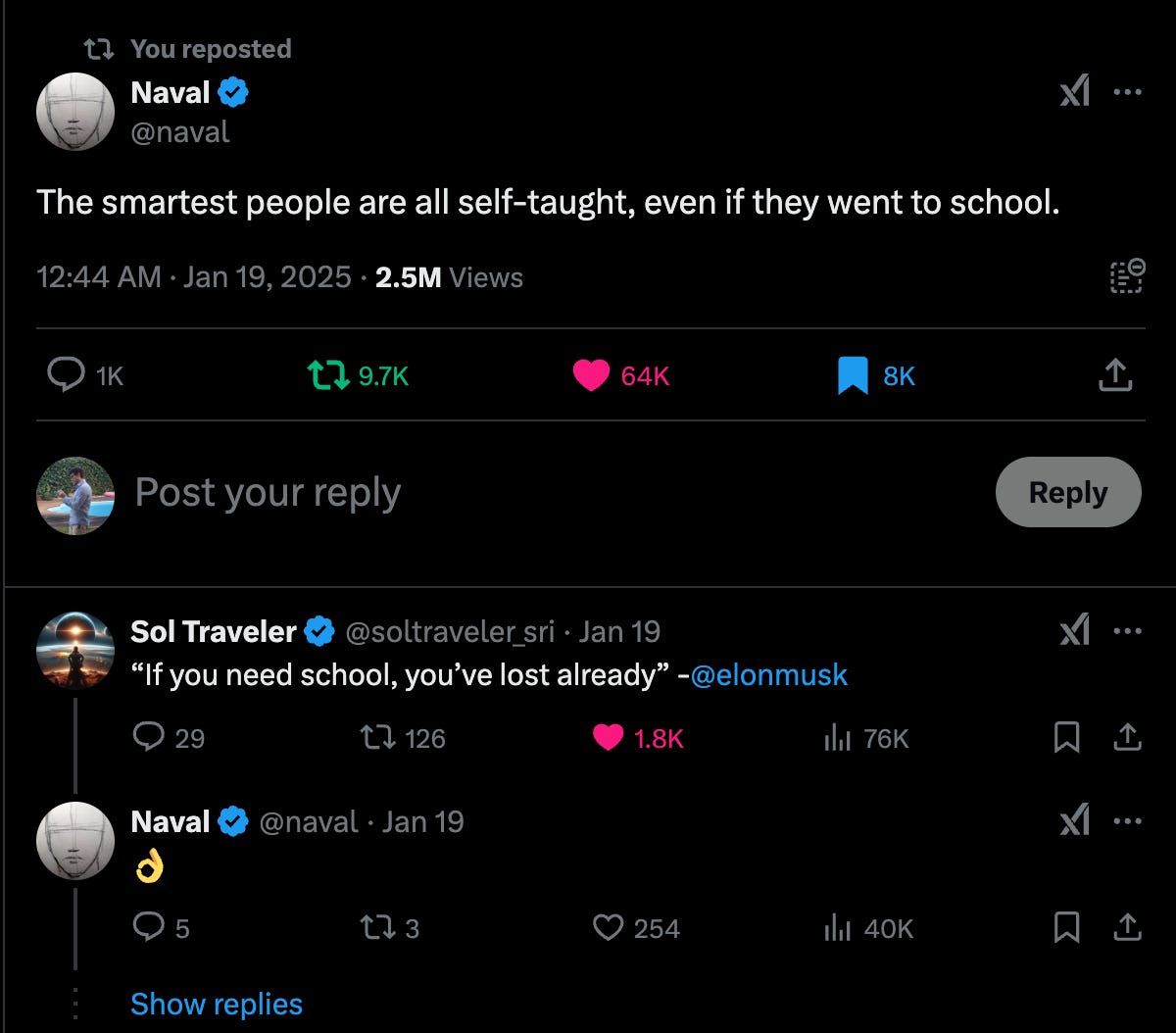Hey friend!
Today’s nugget comes from an old Periscope livestream that Naval Ravikant gave in the year 2018 (and someone gladly recorded it!).
It’s a great decision-making heuristic that has significantly helped me. Thus, it will likely be helpful to you too!
Today’s newsletter is kindly brought to you by PolyPaths!
👤 Doers
💡Nugget
🟠 Naval Ravikant
[A] decision-making heuristic that I use is… If you have two choices to make, such as:
“Do I tell this person A or do I tell them B?”
“Do I take job A or job B?”
“Do I make this sacrifice now, or do I go ahead and do what I want?”
If you have two choices, and they’re relatively equal choices (it looks 50-50 to you) and you can’t decide, take the path that is more difficult and more painful in the short-term. Because what’s actually going on is: One of these paths requires short-term pain, and the other one maybe requires pain further out in the future. And what your brain is doing (through conflict avoidance) is it’s trying to push off the short-term pain. And by definition, if the two are even (50-50) and one has short-term pain, that means it has long-term gain. And by the law of compound interest, the long-term gain is where you want to go towards anyway.
"All self-help boils down to choose long-term over short-term."
— Naval RavikantSo, your brain is overvaluing the side that has the short-term happiness, and it’s trying to avoid the one with short-term pain.
So, you have to cancel that tendency out (and it’s a powerful subconscious tendency) by leaning into the pain.
This cognitive bias is known as the Hyperbolic Discounting:
- We "discount" our (subjective) value of rewards as they are pushed into the future.
- And it's "hyperbolic" because the rate of discount decreases over time (e.g./ There's a big difference between a reward now and within a year from now, but there's little difference between a reward in 20 years and 21 years. Obviously in the first case we assign a much bigger discount).As most of you know, most of the gains in life come from suffering in the short-term, so you can get paid in the long-term. Working out (for me) is not fun. I suffer in the short-term. I feel that pain, but then in the long-term, I’m better off because I have muscles or I’m healthier. In the same way, if I am reading a book and I’m getting confused — like I can’t understand what’s going on — that’s just like working out and the muscle getting sore, but [now] is my brain being overwhelmed. But in the long run I’m getting smarter, because I’m absorbing new concepts at the edge of my capability.
So, you generally want to lean into things that have short-term pain, but have long-term gain.
My trainer, Jerzy Gregorek (also known as the creator of The Happy Body) has a beautiful short saying where he says: “Hard choices, easy life. Easy choices, hard life.” So, what he means by that is:
If you make the hard choices in the short-term (e.g. “I shouldn’t eat bad carbs or processed foods.” Or “I should go ahead and do the workout — which is difficult and I don’t feel like doing it”), then in the long-term you’re going to have an easy life.
But if you make the easy choices in the short-term (e.g. “I’m going to stay out drinking, I’m going to go party, I’m not going to do my work right now, I’m not going to meditate”…), then in the long-term you’re going to have a very difficult life. You will not have built up that self-discipline.
Today’s newsletter is kindly brought to you by PolyPaths!
I was recently introduced to PolyPaths, a newsletter about pursuing and excelling at multiple things in life and embracing your authentic identity! Society often puts pressure on us to fit into a single box, to define ourselves with just one label. We're told to pick a lane and stick to it, but what if you are naturally drawn to multiple paths? What if something inside you compels you to explore and excel at various fields? You can be a doctor and a guitarist and an entrepreneur. You can be a painter and a triathlete and a digital marketer. You can be a teacher and a coder and a dog dad. Why not?
PolyPaths is founded by Apoorvaa Deshpande, who is a computer scientist (now a techie at Google), a musician, a researcher, and also a parent. This is a topic that is deeply personal to her. She is on a mission to provide vocabulary, validation, and motivation for all of us who are drawn to pursuing multiple paths in life with passion and dedication. In the age of AI, embracing our exotic blend of paths will be essential for individual creativity, and will empower us to make unique contributions to the world.. Sidenote, PolyPath also has an AI podcast!
Subscribe to the PolyPaths newsletter and discover how to:
Unlock your full potential: Explore the interconnectedness of your passions and leverage them for personal and professional growth.
Design a life of purpose: Learn practical strategies to manage your time and energy effectively, allowing you to excel in multiple domains.
Find inspiration from the greats: Delve into the lives of renowned PolyPaths, from Leonardo da Vinci to Steve Jobs, and uncover the secrets to their multifaceted success.
It's time to break free from the limitations of a single identity and embrace the PolyPath within you!
💥 Stuff I Loved
Talk you soon!
Julio :)














Love this !
This is very valuable, thank you so much for putting the hard work into this.